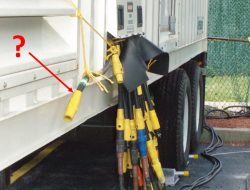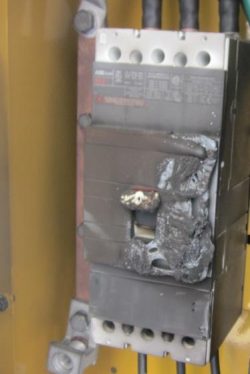Why are Equipment Grounds so Important?
By Lee Marchessault - Published on February 6, 2020 7:54 pm
EPG – Missing Ground Connection
EPG Technicians are trained to identify and understand what is live and what is not. We often think of the ungrounded “hot” wires as the energized parts we need to avoid. We also know that we need to have the grounded wire “neutral” connected in order to complete the circuit and have connected loads function as designed. The neutral is grounded by the grounding wire (“earth ground”) which provides a reference for protective devices. This is an important reason to install system grounds. All protective devices have a time-current curve that is important to understand for protection of the electrical infrastructure and system coordination. Sometimes though, there is a misconception that equipment or case grounding is optional. Grounding wires provide an integral part of the electrical safety and must always be seriously considered.
Here are a few reasons why grounding equipment is so important.
- Protection against electrical overload
One of the most important reasons for grounding electrical currents is that it protects the equipment from ground faults, surges in the utility system, or nearby lightning strikes. These anomalies produce dangerously high voltages in the electrical system. If proper grounding is installed, all the excess electricity will go into the earth — rather than destroying everything connected to the electrical system. - Provides and alternate path for current to flow
Having your electrical equipment effectively grounded means there will be a low resistance path allowing electrical currents to safely and efficiently travel throughout your electrical system to earth ground. - Helps to stabilizes voltage levels
Grounding electrical equipment makes it easier for the right amount of power to be distributed to all the right places, which can play a huge role in helping to ensure circuits aren’t overloaded and blown. The earth provides a common reference point for the many voltage sources in an electrical system. - Earth is the best conductor
One of the reasons why grounding helps to keep you safe is because the earth is such a great conductor, and because current is inversely proportional to resistance, most current follows through the path with least resistance. By grounding your electrical equipment, the alternate path for current to flow is much less resistance than though you – possibly saving your life. - Prevents damage, injury and death
Without a properly grounded electrical equipment, there is a higher risk to damage from a short circuit or ground fault. In the worst-case scenario, an overload of power can cause a fire, risking not just extensive property damage, but also human life. - Grounding and bonding create equal potential
Bonding all equipment within reach on temporary installations (with 6 ft.) creates an equal potential zone. If a ground fault occurs and instantaneously energizes the case, other nearby conductive objects may maintain a ground potential if not bonded to the generator case. This may be a lethal difference in potential causing a severe or fatal shock. Also, bonding metal parts such as drums, battery frames, or other equipment within flammable atmospheric conditions is important to avoid static discharges.
In summary, there are essentially 3 parts of an electrical system that are critical to functionality and safety. Ungrounded wires from the supply (commonly known as “hot” wires, the grounded wire “neutral” which is a normal current-carry wire, and the grounding wire that bonds the neutral to earth and is used for grounding and bonding equipment. Proper grounding and bonding is a critical part of an electrical infrastructure that must not be overlooked.

Overheated Breaker
Categorised in: Electricity
